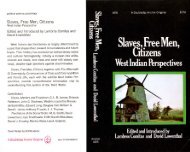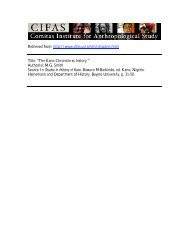e - CIFAS
e - CIFAS
e - CIFAS
You also want an ePaper? Increase the reach of your titles
YUMPU automatically turns print PDFs into web optimized ePapers that Google loves.
GOVERNMENT IN NINETEENTH-CENTURY ABUJA 37<br />
oonsisted entirely of eunuchs; the order of mallams consisted<br />
entirely of Islamic scholars; the order ofhousehold officials, which<br />
contained some slaves as well as freemen, were specially charged<br />
with supervision of the king's household, and formed a royal<br />
council of their o",n; the two orders of public officials were<br />
responsible for territorial, civil, and military administration; and<br />
the remaining order consisted of royal slave-officials.<br />
For lack of any more satisfactory terms, I shall refer to these<br />
groupings as orders of rank, and to their component units as<br />
titles or offices. Offices were associated with titles, and title connoted<br />
rank or membership in a particular order. This use of the<br />
term 'rank' distinguishes it sharply from the more general term<br />
'status'. In the present terminology, a member of the king's line,;<br />
age who lacked office would have royal status but would lack royal<br />
or other rank. As used here, the term 'status' denotes position in a<br />
series of differentiated positions. Thus royal status is distinguished<br />
from non-royal statuses, slave statusfrom free, etc. Inthe context of<br />
state organization, the status of an office is its position within the<br />
system. Such position consists in the last analysis of specific relations<br />
to other units, but these relations also carried prestige. By<br />
status condition we mean position within a series of differentiated<br />
status-groups. Groups of persons differentiated by status are<br />
referred to as status-groups. With these definitions and background<br />
data in mind, the constitution of nineteenth-century Abuja can be<br />
summarized as follows:<br />
Among the titled officials of Ahuja, four basic statuses were<br />
recognized: royals, who were members of the king's lineage or<br />
family, or hereditary chiefs in their own right; freemen, who were<br />
eligible to receive fiefs; eunuchs, who were recruited by the king<br />
from certain villages; and slaves. A fifth status-group consisted of<br />
mallams, who were freemen, butas religious leaders could not hold<br />
fiefs. Mallams were therefore a special group of freemen.<br />
Titles were divided into different rank-orders, and there was an<br />
official order of precedence among title-holders: but this official<br />
order of precedence did not correspond exactly with the grading of<br />
title-holden according to their social status. Promotional opportunities<br />
as well as appointments were defined in terms of social<br />
status. Thus a minor slave-official was eligible for promotion to a<br />
more important office reserved for persons of slave status, and<br />
eunuchs could seek promotion to offices reserved for eunuchs, but<br />
O.z.-





